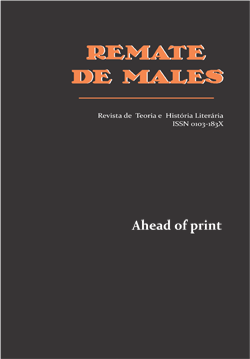Abstract
In digital literature, projects that transgress more conventional notions of materiality and authorship arising from printed literature are increasingly more common, especially those that deny the typical association of one book – one theme – one author. Among other important works of lusophone digital literature, we herein analyze Fantasia Breve, a Palavra-Espuma, an automatic poetry generator designed by Rui Torres, programmed by Nuno Ferreira, based on poems by Ana Hatherly. About this project, we are interested in investigating the complex co-authorial dynamic between the aforementioned creators and the reader, who is also responsible for what is read, given that the poems of Fantasia Breve disappear very quickly from the screen, imposing on the reader the need to decide which portions of the text to read and which to ignore. We thereby observe how the creator, the programmer, the poet and the reader contribute differently and at diverse times of production/execution/reception to the construction of meanings in the poems automatically and randomly generated by the software. We also highlight the concepts of hyper-reading, combinatorics, non-creative writing and remixing as analytical operators, and we try to situate Fantasia Breve, a Palavra-Espuma in the Lusitanian literary series in relation to other combinatorial-procedural poetic experiments, especially the Iberian Mannerist and Baroque poetry, and Portuguese experimental poetry from the 20th century.
References
AARSETH, Espen. Cybertext: Perspectives on Ergodic Literature. Baltimore: The John Hopkins University Press, 1997.
BARTHES, Roland. A morte do autor. In: O rumor da língua. São Paulo: Martins Fontes, 2004, pp. 57-64.
BLOCK, Friedrich W.; TORRES, Rui. Poetic Transformations in(to) the Digital. 2007. Disponível em: <https://po-ex.net/taxonomia/transtextualidades/metatextualidadesalografas/torres-block-poetic-transformations-into-the-digital/>. Acesso em: 2 jan. 2022.
BORDINI, Maria da Glória. Variações sobre um tema de Joyce: Ana Hatherly e a reinvenção de si mesma. In: ALVES, Ida; BARBOSA, Rogério (Orgs.). Encontros com Ana Hatherly. Rio de Janeiro: Oficina Raquel, 2015, pp. 140-154.
CULTURAL TREND LISBON. Programação Festival do Silêncio. 2016. Disponível em: https://encurtador.com.br/jmwRW>. Acesso em: 1 abr. 2021.
DEICKE, Débora Keppi; PEREIRA, Vinícius Carvalho. A dissolução das noções de materialidade e autoria na ciberliteratura: um olhar para a obra Fantasia breve, a palavra-espuma. Scripta, v. 24, n. 52, 2020, pp. 210-234.
DOS SANTOS, Alckmar Luiz. Leituras de nós: ciberespaço e literatura. São Paulo: Itaú Cultural, 2003.
EDMONDS, Ernest. Generative Art: A Semiotic Exchange. In: BARBOSA, Simone; BREITMAN, Karin (Eds.). Conversations Around Semiotic Engineering. New York City: Springer International Publishing, 2017, pp. 71-79.
FERNANDES, Annie Gisele. Ana Hatherly, o espaço crítico e sua poesia. In: ALVES, Ida; BARBOSA, Rogério (Orgs.). Encontros com Ana Hatherly. Rio de Janeiro: Oficina Raquel, 2015, pp. 15-34.
FERREIRA, Nuno. Linkedin. 2021. Disponível em: <https://pt.linkedin.com/in/nunofferreira>. Acesso em: 2 fev. 2022.
GAINZA, Carolina Cortés. Nuevos escenarios literários: hacia una cartografía de la literatura digital latino-americana. In: GUERRERO, Gustavo; LOY, Benjamin; MÜLLER, Gesine. World Editors: Dynamics of Global Publishing and the Latin American Case between the Archive and the Digital Age. Berlim: De Gruyter, 2020, pp. 331-349.
GOLDSMITH, Kenneth. Uncreative Writing. Nova Yorque: Columbia University Press, 2011.
HATHERLY, Ana. A experiência do prodígio. Bases teóricas e antologia de textos-visuais portugueses dos séculos XVII e XVIII. Lisboa: Conselho da Europa, 1983.
HATHERLY, Ana. A casa das musas: uma releitura crítica da tradição. Lisboa: Estampa, 1995.
HATHERLY, Ana. Um calculador de improbabilidades. Coimbra: Quimera Editores, 2001.
HAYLES, Katherine. Literatura eletrônica: novos horizontes para o literário. Passo Fundo: UPF, 2009.
HUTCHEON, Linda. Uma teoria da adaptação. Florianópolis: Editora da UFSC, 2011.
KIRCHOF, Edgar Roberto. O livro de literatura para crianças e jovens no universo digital: transformações, desafios e possibilidades. Cadernos de Educação, Pelotas, n. 65, 2021, pp.1-18.
KLUCINSKAS, Jean; MOSER, Walter. Interculturalidade: a estética à prova da reciclagem cultural. Scripta, Belo Horizonte, v. 11, n. 20, 1º sem. 2007, pp. 17-42.
LANDOW, George. Hypertext: The Convergence of Contemporary Critical Theory and Technology. Baltimore: Johns Hopkins University Press, 1992.
MARINO, Mark. Critical Code Studies. Cambridge: MIT Press, 2020.
MELO E CASTRO, Ernesto Manuel de. Poética do ciborgue. Rio de Janeiro: Confraria do Vento, 2014.
MESA, Rafael García. Ciberliteratura: juegos de lenguaje y literatura virtual. In: ROSA, José Reyes et al. (Orgs.). Creatividad y literatura potencial: actas de las primeras jornadas hispanofrancesas de creatividad y literatura potencial. Córdoba: Universidad de Córdoba, 2006.
NAVAS, Eduardo. Remix Theory: The Aesthetics of Sampling. Nova Iorque/Viena: Springer, 2012.
PEREIRA, Vinícius Carvalho. O valor da letra e o sentido do número: Literatura e Matemática na produção do Oulipo. Cuiabá: EdUFMT, 2019a.
PEREIRA, Vinícius Carvalho. Poéticas da/na interface: uma leitura de Fantasia breve, a palavra-espuma – gerador automático de poemas com base em versos de Ana Hatherly. Verbo de Minas, Juiz de Fora, v. 20, n. 35, 2019b, pp. 35-54.
PEREIRA, Vinícius Carvalho. Textos artísticos que geram textos artísticos: uma análise semiótica de motores textuais de Rui Torres. MATLIT: Materialidades da Literatura, v. 7, n. 1, 2019, pp. 153-174.
QUENEAU, Raymond. Cent mille milliards de poèmes. Paris: Gallimard, 1961.
RETTBERG, Scott. Electronic Literature. Cambridge: Polity, 2019.
ROCHA, Rejane. Contribuições para uma reflexão sobre a Literatura em contexto digital. Revista da Anpoll, v. 1, n. 36, 2014, pp. 160-186.
SALGADO, Marcus Rogério. As metamorfoses na escrita: constelações de palavras e imagens na obra plástica de Ana Hatherly. In: ALVES, Ida; BARBOSA, Rogério (Orgs.). Encontros com Ana Hatherly. Rio de Janeiro: Oficina Raquel, 2015, pp. 127-139.
SCHÄFER, Jörgen. Gutenberg Galaxy Revis(it)ed: A Brief History of Combinatory, Hypertextual and Collaborative Literature from the Baroque Period to the Present. In: GENDOLLA, Peter; SCHÄFER, Jörgen (Eds.). The Aesthetics of Net Literature. Bielefeld: Transcript Publishing, 2007, pp. 121-160.
SOSNOSKI, James. Hyper-Readers and Their Reading Engines. In: HAWISHER, Gail; SELFE, Cynthia (Eds.). Passions, Politics, and 21st Century Technologies. Logan, Utah and Urbana, Illinois: Utah State University Press‐NCTE, 1999, pp. 161-177.
TORRES, Rui. Fantasia breve: a palavra-espuma. 2016. Disponível em: <http://www.telepoesis.net/palavra-espuma/>. Acesso em: 3 set. 2019.

This work is licensed under a Creative Commons Attribution-NonCommercial 4.0 International License.
Copyright (c) 2023 Creative Commons Licence


